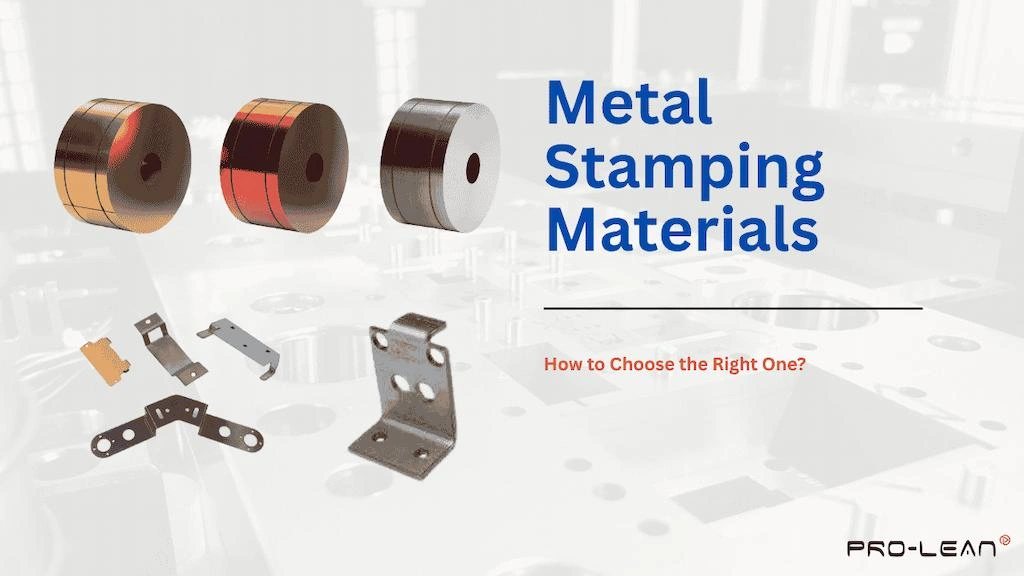
Metal Stamping Materials
Metal stamping can make a wide range of sheet metal parts with excellent repeatability. You can use soft aluminum to tough titanium sheets, based on the application requirements. However, choosing the right material for your project requires an understanding of compatible materials, their properties, cost, and application preferences.
This article will discuss eight metal stamping materials, factors to consider during the material selection process, coating & plating options for stamping parts, and types of precision stamping steels.
Why Choosing the Right Material Matters in Stamping?
Choosing the right stamping material is not only important for meeting the end application requirements, but also for controlling the stamping operations. Variables such as sheet thickness, bending stress, and punching force are influenced by the material type.
Consequently, material selection also impacts the design flexibility, surface finishing, process efficiency, and production cost. Due to these reasons, it is essential to select a suitable material for sheet metal stamping.
If you are unsure which metal is ideal for your parts, contact us and get expert guidance to make the right decision.
What Are the Common Stamping Materials?
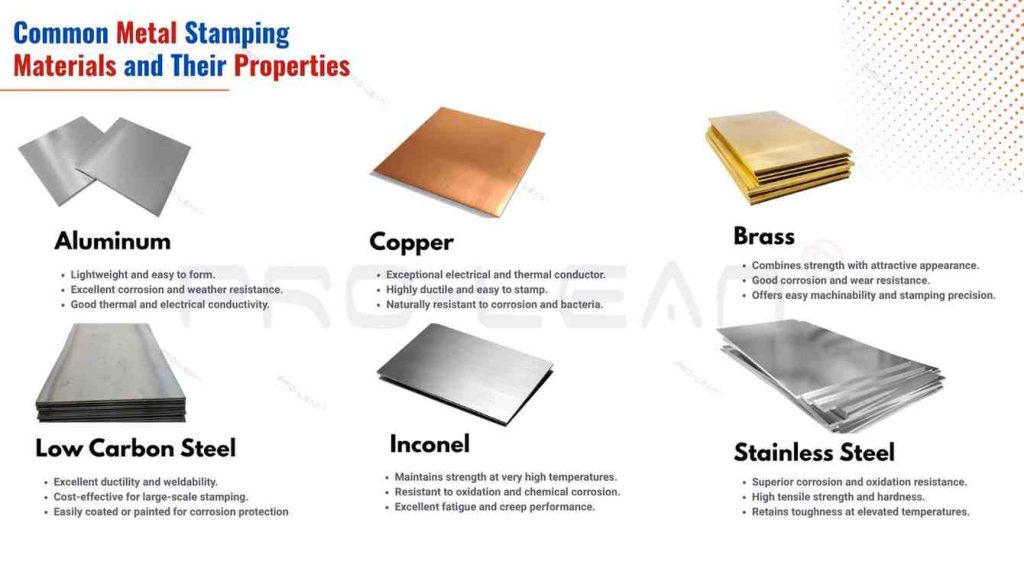
Metal stamping materials
You can use aluminum, copper, brass, bronze, stainless steel, titanium, low-carbon steel, and their various alloys to produce custom metal stamping parts. Each of these materials has unique benefits and formability.
Let’s look at them in more detail.
Aluminum
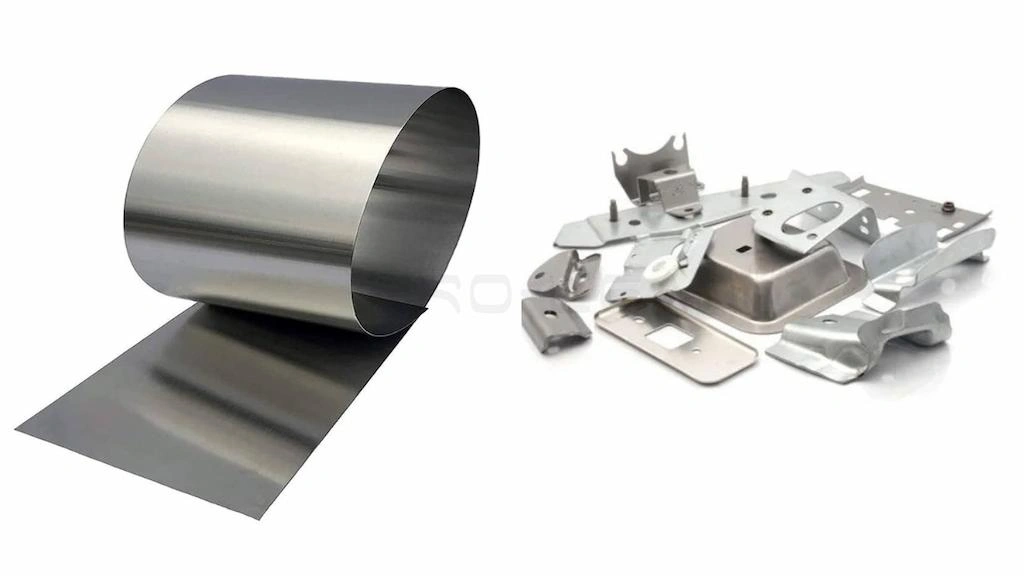
Aluminum stamping sheet
Aluminum is a non-ferrous metal characterized by its high strength-to-weight ratio. This while-silverish material provides good formability, corrosion resistance, and excellent deep drawn capability. The aluminum stamping process does not involve complex setups and considerations; in fact, a simple progressive die-press mechanism can produce complex parts from aluminum sheets.
The 1100 series alloys, 3003, 5052, 5005, 6063, 5083, and 6061 grades, are most popular in stamping applications.
Pure aluminum (1100) is known for ductility and is used for deep-drawing parts. 5052 provides a balance of strength and stamping performance. 6061 is heat-treatable and more suitable for stamping structural parts.
Copper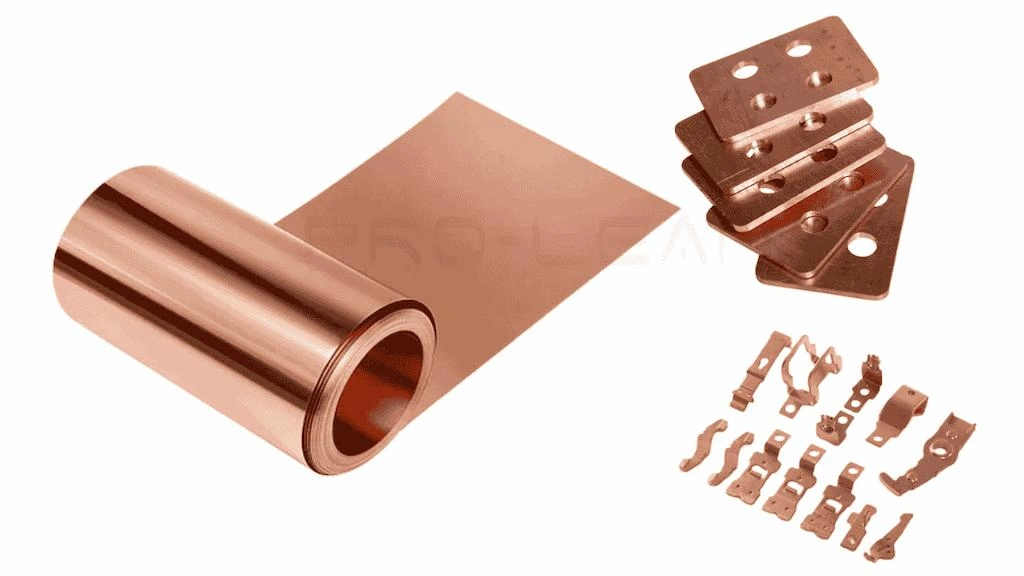
Copper stamping
Copper is a ductile, conductive, corrosion-resistant, and antibacterial metal with a slightly reddish aesthetic. When exposed to the environment, it develops a protective film on its surface, safeguarding the underlying material.
Often, copper is mixed with zinc, nickel, or other alloying elements to enhance the strength & other properties. For example, berylliumcopper(C17200 ) and phosphorus bronze (C51900). However, pure copper is also suitable for stamping projects, such as C101 and C110.
Copper stamping can be used to form electrical busbars, low-loss conductors, and various components for industrial equipment.
Stainless Steel
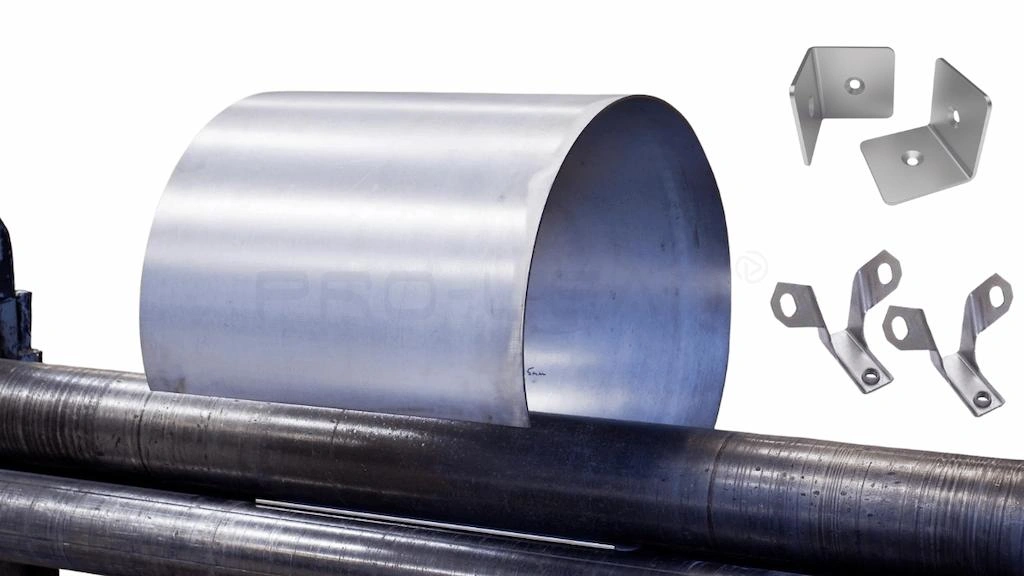
stainless steel forming
Stainless steel is the most popular type of steel alloy, composed of more than 10.5% chromium, 8-10% nickel, and 0.02 to 1.2% of other alloying metals in small amounts, such as molybdenum and manganese.
Different stainless grades are used for stamping due to their high mechanical strength, corrosion resistance, attractive finish, and magnetic properties. The common stamping grades include 301, 302, 305, 316, 321, 410, 420, 440A, A286 17-4 PH, 17-7 PH, and AM350.
300 series grades are austenitic steels with excellent corrosion resistance and ductility, but have a relatively higher work hardening rate. Consequently, 400 series grades are ferritic and still offer good formability for stamping operations.
Some notable stainless steel stamping applications are automotive brackets, kitchen sinks, electronics shields, food processing components, and panels for household appliances.
Low Carbon Steel
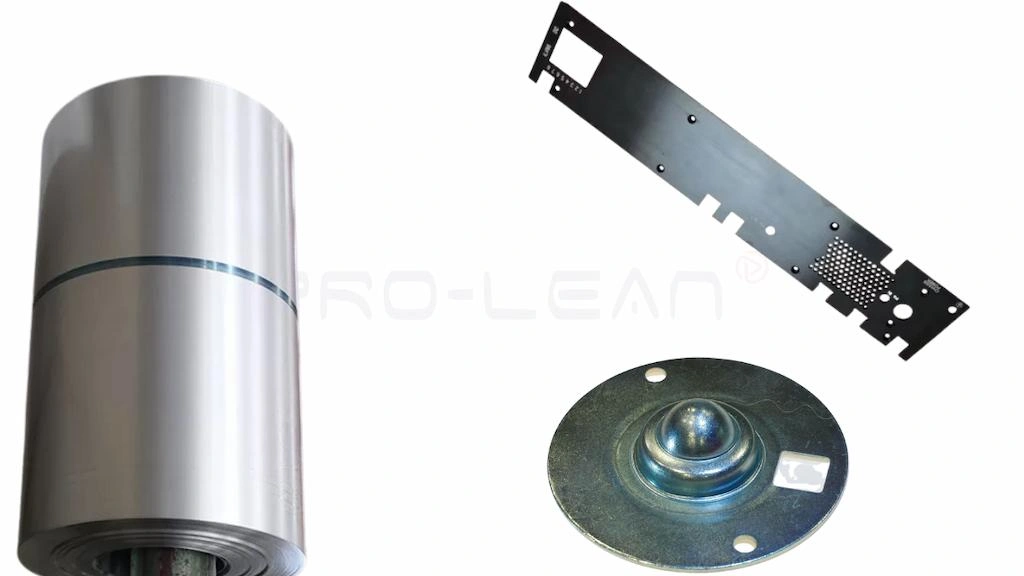
low carbon steel stamping
The low-carbon steel alloys contain 0.05 to 0.3% of carbon in their composition, along with manganese, phosphorus, and silica. This small amount of carbon helps to improve strength while balancing the formability.
Subsequently, low-carbon steels offer good weldability, malleability, tensile strength, and cost benefit. Although they are prone to corrosion and wear, the surface can be hardened with carburization or other treatments. Moreover, common grades for low carbon steel stamping are 1018, 1008, and 1010.
Brass
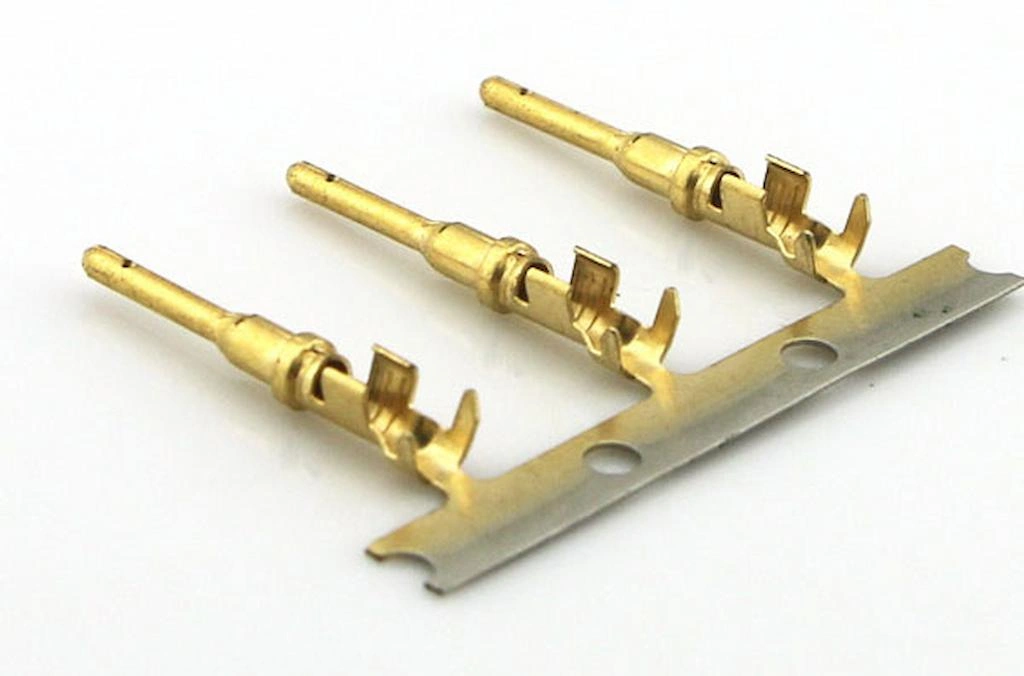
Brass stamping
Brass is an alloy of copper and zinc, known for conductivity, strength, aesthetic appeal, corrosion-resistance, and antibacterial benefits. It leverages properties of both copper and zinc, along with other elements mixed in a minor proportion.
The ductility of brass allows stamping to shape it into complex bends, curvatures, and tight radii. Meanwhile, you can choose a suitable brass grade, such as C26000, C26800, C27200, C27000, and C36000.
Furthermore, brass stamping is used for medical items, electrical components, architectural elements, and fitting hardware.
Bronze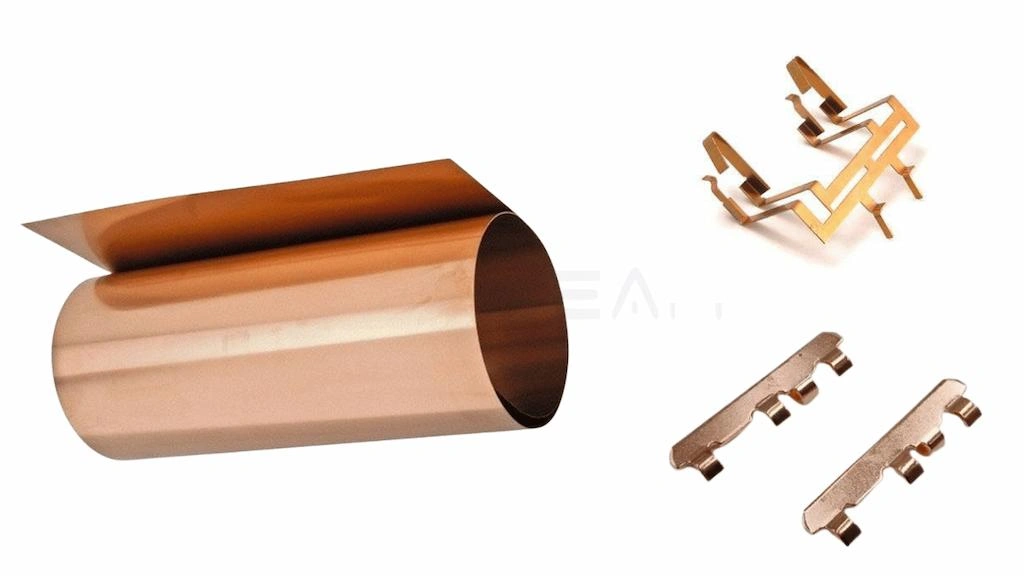
Bronze stamping
Bronze is composed of tin, zinc, aluminum, and phosphorus, where copper is the primary alloying element. It comes in different grades and provides higher stiffness, wear resistance, corrosion resistance, and versatility in stamping compared to pure copper.
Although several bronze grades are compatible with metal stamping, phosphorus bronze is particularly popular due to its high fatigue, formability, and versatile properties. Meanwhile, typical applications of bronze stamping are decorative hardware, bushing enclosures, washers & spacers, and electrical connectors.
Titanium 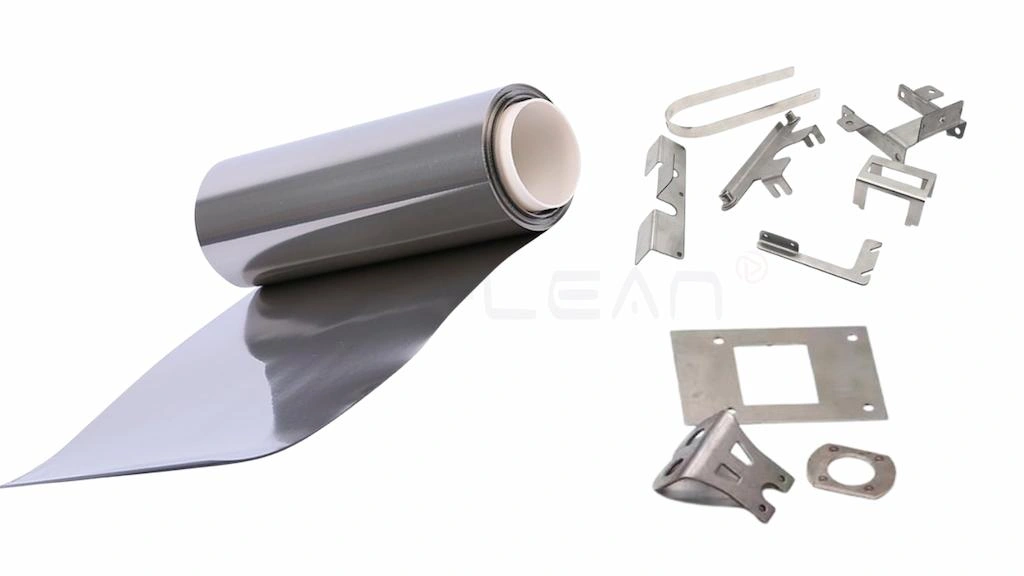
Titanium stamping
Titanium stamping produces tough and lightweight parts for automotive, aerospace, marine, and other industries. Subsequently, its alloy grades possess versatile properties, offering high corrosion resistance, stiffness, and the ability to perform at high temperatures. The common titanium stamping grades are: Grade 1, Grade 2, Grade 4, Grade 9, and Grade 5 (6AL4V).
Although titanium has relatively lower formability, it can be stamped into complex shapes with tool steel or carbide dies and high pressing force.
Inconel
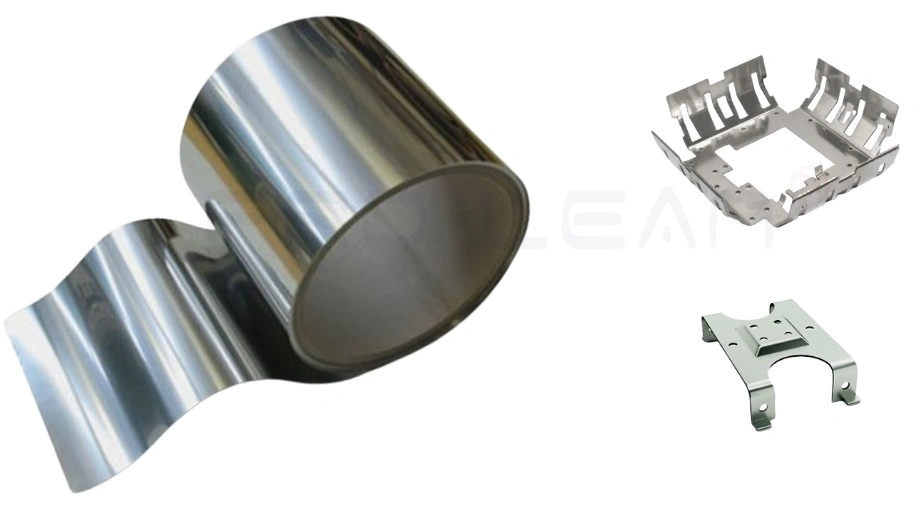
Inconel stamping
Inconel is composed of nickel and chromium as the main alloying constituents, along with molybdenum, aluminum, and titanium in small amounts. It is also known as a super alloy as it can perform under high pressure and temperature.
Inconel stamping requires specialized die tooling and high forming loads. Manufacturers also use hot forming to counter its toughness.
Some notable examples of inconel stamping parts are aircraft brackets, heat shields, exhaust systems, components for power generation plants, and high-performance vehicle parts.
Try Prolean Now!
Types of Precision Stamping Steels: Hot Roll Vs Cold Roll Vs Galvalume
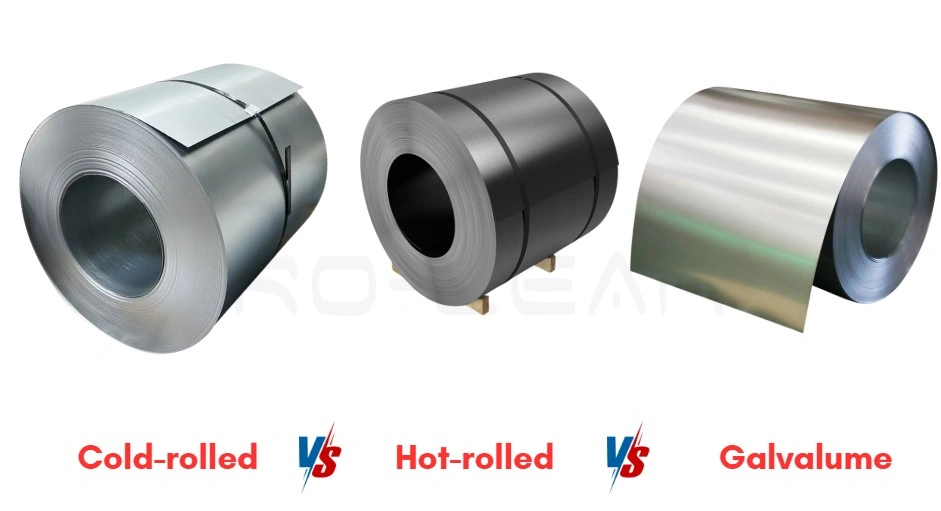
Hot rolled vs cold rolled steel
Precision stamping typically refers to parts with tolerances tighter than 0.13 mm. You can use hot roll, cold roll, or galvalume for precision steel parts.
Hot-rolled steel refers to steel that is roll-pressed with intense heat and then quickly cooled, whereas cold-rolled steel is subjected to extreme pressure at room temperature. Next, Galvalume steels are low-carbon steels that are hot-dipped in a zinc-aluminium solution.
Let’s take a look at the comparison table of these three precision metal stamping materials:
| Property | Hot-rolled | Cold-rolled | Galvalume |
| Metallurgical properties | Coarser grain, lower yield strength, high ductility | Work-hardened, higher strength, fine-grain | Same as low-Carbon steel |
| Stamping tolerance | Loose | Tight (best) | Moderate |
| Formability | Very good for deep draw | Good, but limited by strength | Slightly reduced due to the coating |
| Cost | Lowest | Higher | Higher than HR |
| Dimensional stability | Low | High | Moderate |
| Parts examples | Large structural panels, brackets | Precision housings, automotive inner panels | Roofing panels, exterior trim, HVAC |
The above comparison states that hot-rolled and cold-rolled steels are more preferred for precision stamping parts than galvalume steels.
Factors to Consider for Choosing the Right Stamping Material
The best metal or alloy for your stamping parts depends on the end application, formability, strength, cost, and process variables. Considering these factors during material selection helps to identify the best material at a competitive cost.
Let’s look at the common factors to consider in brief:
- End-Use Requirements: Define the physical and mechanical properties required for the application, considering the complexity of the parts and their operating environment.
- Formability: Metals with low formability are challenging to shape into complex parts as they require extremely heavy presses. Additionally, they are more prone to cracks.
- Tensile Strength: High tensile strength means it can withstand higher bending forces, and tighter bends can be achieved. So, consider this strength if your parts have small bends.
-
- Work Hardening: A Higher work hardening rate makes the material brittle and hard for forming operations. Additionally, it can lead to cracks at the bending line. So, consider whether the material has a work-hardening rate within the acceptable limit or not.
- Metal Stamping Cost: It includes both material cost and stamping cost. Consider which raw material costs less in the market while offering good formability, but do not sacrifice the properties required for functionality & performance.
Common Problems Encountered with Improper Material Selection
Choosing the improper material directly impacts the functionality and performance of stamping parts. Consequently, it also affects the stamping operations and increases the risk of material cracking.
Let’s look at the common problems encountered with the incorrect material section.
- Corrosion: If you are stamping parts for humid, chloride, or other similar environments, improper material selection can lead to rapid corrosion and wear.
- Fatigue Failure: If you choose a material with low fatigue strength, the parts might crack under high stress.
- Material Fracture: If the chosen material has poor formability, the sheet might crack or fracture during stamping.
- Excessive Wear: Materials with low hardness or poor tribological properties wear quickly against mating surfaces, resulting in higher clearance, vibration, and costly maintenance of stamp tooling.
Try Prolean Now!
What Are the Different Precision Forming Operations in Metal Stamping?
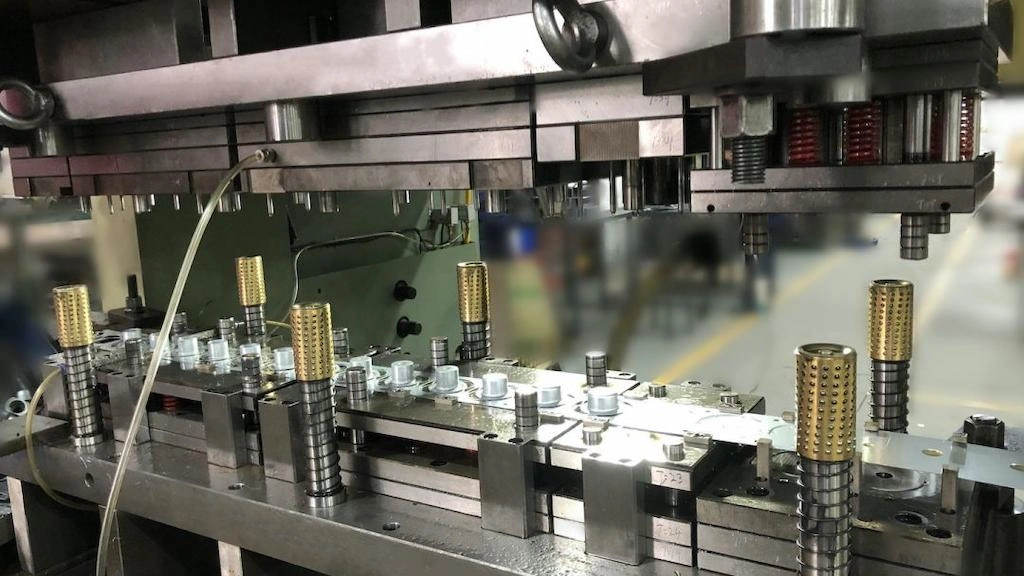
Stamping operations
Stamping is known for creating complex sheet metal parts at high speed while maintaining repeatability. So, it is inherently characterized by the ability to perform multiple forming operations. Consequently, the dies and presses are arranged for stamping based on the number of forming operations required to achieve the design geometry.
Here is the list of common precision forming operations in metal stamping:
- Bending
- Hole punching
- Deep-drawing
- Notching
- Embossing
- Hemming
- Edge Trimming
- Curling
- Necking
- Extrusion
Are you further interested in metal forming processes? Read the article “ Punching vs Stamping” here.
Coating and Plating of Metal Stamping Parts
Like every other manufactured item, you can apply metal coating, plating, heat treatment, and other surface finishing methods. Not only for aesthetic treatment, but post-processing and finishing also help to improve the original properties.
Keep in mind that the plating (or coating) material must be compatible with the substrate surface. For example, zinc plating is suitable for low-carbon steel stamping parts, while chrome plating provides a protective and aesthetically pleasing finish for steel stamping parts.
Moreover, you can choose nickel, zinc, chromium, palladium, silver, or other metals for plating, whereas epoxy-based powders are best for thermal coating.
Do You Need a Manufacturing Partner for Metal Stamping Parts?
If you are looking to outsource sheet metal stamping parts, there are several factors you must consider when selecting a manufacturer. First, shortlist the online stamping service providers.
Then, analyze their production capabilities, precision, lead time, communication flexibility, available materials, and experience in handling related projects. Once you have analyzed and identified a few companies that can fulfill your requirements, compare their pricing structures.
If you need our pricing structure for stamping services, upload the design with detailed specifications and get a quote.
Why ProleanTech?
✔ A diverse range of precision metal stamping materials
✔ Advanced CNC systems with progressive dies and transfer stamping molds.
✔ Tight tolerances as low as ±0.05mm, depending on the thickness and complexity.
✔ An expert team of engineers and operators for process handling
✔ Excellent Repeatability
✔ Strict quality control measures
Conclusion
You can find a wide variety of metals and alloys for sheet metal stamping, ranging from ductile aluminum and copper to tough titanium and Inconel. As material toughness increases, it becomes more challenging to perform stamping operations.
The choice depends on the required physical & mechanical properties for applications, formability, and cost. You must define your end-use requirements and analyze which material provides the best price-to-performance value.
Ultimately, it is crucial to choose an experienced and reliable manufacturer like ProleanTech, which is equipped with advanced CNC stamping systems and offers extensive material options.
FAQ
What is the best material for metal stamping?
There is no single best material for stamping; the best material for you depends on the end use of the stamped parts. Low-carbon alloys are best suited for general-purpose stamping, aluminum alloys are ideal for lightweight applications, and copper/brass are best for electrical parts.
What is the easiest metal to stamp?
Aluminum is the easiest metal to stamp due to its excellent formability and minimal work-hardening rate. You can easily perform multiple forming operations on an aluminum sheet without causing any metal stamping defects.

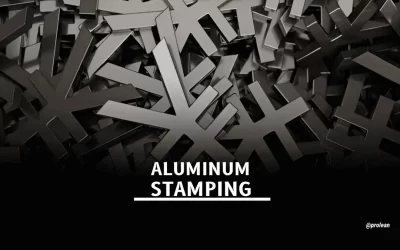
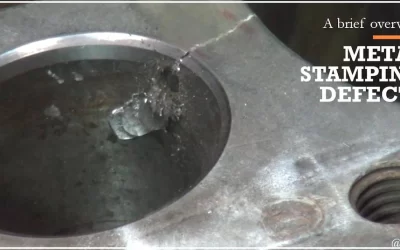
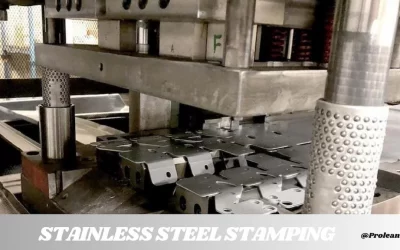
0 Comments